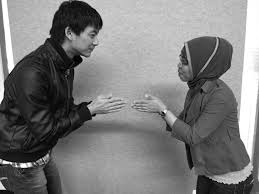INTRODUCTION – PERKENALAN (Dialogues) Posted by asimonoff on Sep 28, 2014 in Uncategorized
In Indonesia, when you are introducing yourself, or you are being introducing by someone, usually, you are expected to say your name. Then, at the same time, for men, it is customary to shake hands by taking the other person’s hand in a light, bland-clap and a slow and deliberate manner. However, when you are introduced to someone who is older or in authority, to bow a little or to give a nod is necessary to show respect. On the other hand, when a man is introduced to a woman who is wearing a Muslim headdress known as “jilbab” or “kerudung”, allow her to initiate the handshake. If not, a man just nods, smiles and greets with words. In Islamic customs, it is regarded as improper for a man and a woman to touch each other physically, unless they are husband and wife, or considered unmarriageable, such as mother and son, brother and sister. In a social situation, it is proper to introduce a younger one to an older one, and a person of a lower rank to a higher rank, regardless of gender.
Those who are left-handed may need to adjust to using their right hand more. Indonesians consider the left hand unclean, so whenever possible, it should not be used to give or receive items, or to shake hands.
Last but not least, don’t forget to smile and perform a handshake in a slow, deliberate manner, as a hurried introduction can be perceived as disrespectful. Unless you have a close relationship with an individual, always address others using the formal “Mr.” or “Ma’am/Mrs./Ms.,” even if the encounter is informal.
Let’s practice with the following dialogues.
Introducing yourself – Memperkenalkan diri
Dialogue 1: Informal
The conversation takes place at a super market in Jakarta.
| How to say it in Indonesian | How to say it in English |
| Joko: Apa ini Pak James Adiknya Pak Alexander? | Joko: Are you James, Alexander’s brother? |
| James: Betul, siapa ya? | James: Yes, I am. May I know whom I am speaking to? |
| Joko: Saya Joko, teman Pak Alexander. | Joko: I am Joko, a friend of Alexander |
| James: apa kita pernah bertemu? | James: Have we met before? |
| Joko: Ya. Alexander memperkenalkan kita di pesta ulang tahun dia. | Joko: Yes, Alexander introduced us at his party. |
| James: Wah maaf saya lupa, sudah lama sekali. | James: I am sorry. I don’t remember. It was quite some time ago. |
| Joko: Tidak masalah. (Anda) tinggal di mana sekarang? | Joko: That’s ok. Where do you live now? |
| James: Saya tinggal di Bali sekarang. Saya punya agen perjalanan. Sudah hampir 4 tahun ini. | James: I live in Bali now. I have a travel agent for almost four years now. |
| Joko: Wah sukses ya. Baiklah saya harus pergi. Salam untuk Alex, Ya. | Joko: I am glad your business is thriving. I am sorry I have to leave now. It is nice to see you again. Could you please say hello for Alexander from me? |
| James: Ya, terima kasih. | James: I will. Thank you. |
Note:
In an informal situation, it is acceptable not to use a complete sentence. You can drop the subject in a sentence, the prefix, and the suffix (“memperkenalkan” or “perkenalkan” became ‘kenalkan’) as it is understood.
Dialogue 2: Formal
The conversation takes place in between coffee breaks of a business meeting in Jakarta.
| How to Say It in Indonesian | How to Say It in English |
| Sumarna: Selamat siang, Pak. Kenalkan, saya Sumarna.
Andi: Selamat siang. Saya Andi. Sumarna: Anda menginap di mana? Andi: Saya menginap di Hotel Indonesia Kepinski di Jalan Thamrin. Sumarna: Hotel kita berseberangan; saya menginap di Hotel Grand Hyatt. Andi: Anda naik apa ke rapat besok? Sumarna: Saya naik taksi. Andi: Kita bisa pergi bersama ke rapat besok. Andi: Itu ide yang baik. Saya tunggu besok di depan hotel jam 08.00 pagi. Sumarna: Baiklah. Sampai besok, ya.
|
Sumarna: Hello. I am Sumarna.
Andi: Andi! Nice to meet you. Sumarna: Nice to meet you, too. Where do you stay? Andi: I stay at Hotel Indonesia Kempinski in Jalan Thamrin, Sumarna: Our hotel are across the street from each other. I stay at Grant Hyatt Hotel. Andi: How will you go to the meeting tomorrow? Sumarna: I will take a taxi. Andi: I drive my car. We can go together to tomorrow’s meeting. Andi: That is a good idea. I will wait for you in front of the hotel at 08:00 am. Sumarna: Great. See you tomorrow.
|
Note:
Did you see the difference? How is the introduction is started? Indonesians use greetings, like “selamat pagi” instead of saying, “It is nice to meet you” or “It is nice to meet you, too.”
Introducing others – Memperkenalkan orang lain
Dialogue 1: Informal
The dialogue takes place at a gathering of friends.
| How to Say It in Indonesian | How to Say It in English |
| Sumarni: Rit, kenalkan, ini teman baik dan teman kerja saya, Hasan.
Rita: Rita!. Apa kabar? 1) Hasan: Baik-baik saja, terima kasih. Teman di mana? Rita: Kami teman kuliah. Hasan: Oh, apa Rita orang Bandung juga? Rita: Tidak, saya asli Jakarta. Hasan: Wah, kita sama-sama orang Jakarta, ya. Jakartanya di mana? Rita: Di daerah Menteng. Hasan: Kita bertetangga rupanya. Sumarni: Ya, mungkin Anda berdua bisa jalan pagi bersama. Hasan and Rita: Kenapa tidak?
|
Sumarni: Rit, this is my good friend and colleague, Hasan.
Rita: I am pleased to meet you.1) Hasan: Pleased to meet you too. Are you and Sumarni know each other long? Rita: We are friends from college. Hasan: Oh yeah? Are you from Bandung too? Rita: No. I am a native Jakartan. Hasan: Well, it seems like both of us native Jakartan. Where do you live? Rita: In Menteng. Hasan: We are neighbors, then. Sumarni: Yeah, both of you could do your morning walk together. Hasan and Rita: Why not? |
Note:
1) Apa kabar? Or “What is news?” is similar to “I am pleased to meet you in English.”
2) In Indonesia, sometimes people use your first name as a substitute of “you” rather than using pronouns, like “Anda” and “Saudara”. We can also address someone with “kamu” for a second person, but it is considered rude or disrespectful if you just met. You can use “kamu” if you are close friends or you know someone well.
Dialogue 2: Formal
The dialogue takes place at a Seminar in Jakarta, Indonesia.
| How to Say It in Indonesian | How to Say It in English |
| Sumarni: Selamat siang, Bu Rita. (per)kenalkan initeman baik dan rekan kerja saya, Dr. Hasan Sadily. | Sumarni: I would like you to meet my good friend and colleague, Dr. Hasan Sadily. Hasan, this is Ms. Rita. She is a friend from college. |
| Rita: Selamat siang, Pak; apa kabar? Saya Rita (extend her hand first for a hand shake). | Rita: Rita!. Nice to meet you; how are you? |
| Hasan: Hasan!. (He extend hiss hand to shake her hand), baik, terima kasih. | Hasan: Hasan! I am fine, thank you, and you 1). (Rita: I am fine thank you) 2) |
| Rita: Apa Bapak juga* berasal dari Bandung?/Apa bapak berasal dari Bandung juga*? | Rita: Are you originally from Bandung too? (Sumarni is originally from Bandung, West Java). |
| Hasan: Tidak saya asli Jakarta | Hasan: No. I am native Jakartan. |
| Sumarni: Bapak dan Ibu, mari kita masuk, sesi kedua sudah akan dimulai. | Sumarni: Sir, Ma’am, let’s get inside, session two will start soon. |
*Juga or “too” can be placed before the verb or at the end of the sentence.Note:
1) Indonesians do not say ‘and you’ as it is in English. Compare the similar line in ‘how to say it in Indonesian’
2) In general, only the person who is introduced to is the one who ask “how are you?”

Build vocabulary, practice pronunciation, and more with Transparent Language Online. Available anytime, anywhere, on any device.
About the Author: asimonoff
I’m an Indonesian language instructor, instructional material developer, reading test developer, and interpreter. I have been teaching Indonesian to adult students for 15 years, and have been teaching students from many backgrounds, such as private, military and diplomatic service employees. I’m Indonesian, but am living in the US now; my exposure to different cultures in my home country and in the US has enriched my knowledge in teaching Indonesian as a second language. I approach the teaching of the Indonesian language by developing students’ critical cultural awareness and competence. This method of teaching has been proven to be a key to the success of my students. Students become conscious of the essential role culture plays in the language.





